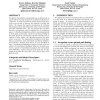Free Online Productivity Tools
i2Speak
i2Symbol
i2OCR
iTex2Img
iWeb2Print
iWeb2Shot
i2Type
iPdf2Split
iPdf2Merge
i2Bopomofo
i2Arabic
i2Style
i2Image
i2PDF
iLatex2Rtf
Sci2ools
114
click to vote
ATAL
2006
Springer
2006
Springer
Distributed navigation in an unknown physical environment
We address the problem of navigating from an initial node to a goal node by a group of agents in an unknown physical environment. In such environments mobile agents must physically move around to discover the existence of nodes and edges. We assume that agents communicate by exchanging messages about their discoveries, their current locations and their intended plans. We also assume that an agent can only communicate with a predefined set of neighboring agents. A distributed algorithm, which is run independently by each agent, is presented. Given the current knowledge of the agent about the environment and the positions and intentions of other agents, the algorithm instructs the agent where to go next. An experimental evaluation of the algorithm is presented, with constrained and liberal neighborhood schemes. Results show that it is more beneficial to have a constrained neighborhood scheme because with this scheme the distributed intelligent behavior of agents generates a spread of kn...
Related Content
| Added | 20 Aug 2010 |
| Updated | 20 Aug 2010 |
| Type | Conference |
| Year | 2006 |
| Where | ATAL |
| Authors | Arnon Gilboa, Amnon Meisels, Ariel Felner |
Comments (0)

